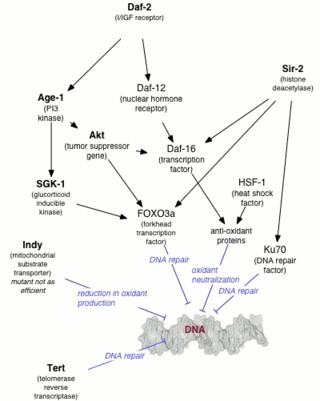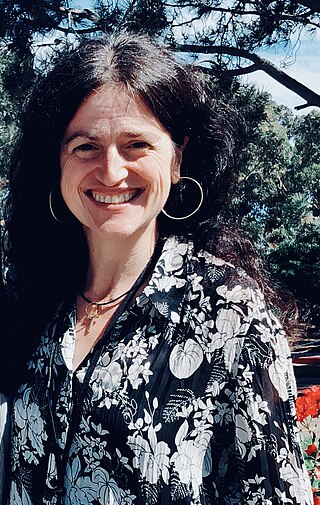Maximum life span is a measure of the maximum amount of time one or more members of a population have been observed to survive between birth and death. The term can also denote an estimate of the maximum amount of time that a member of a given species could survive between birth and death, provided circumstances that are optimal to that member's longevity.
Calorie restriction mimetics (CRM), also known as energy restriction mimetics, are a hypothetical class of dietary supplements or drug candidates that would, in principle, mimic the substantial anti-aging effects that calorie restriction (CR) has on many laboratory animals and humans. CR is defined as a reduction in calorie intake of 20% to 50% without incurring malnutrition or a reduction in essential nutrients. An effective CRM would alter the key metabolic pathways involved in the effects of CR itself, leading to preserved youthful health and longer lifespan without the need to reduce food intake. The term was coined by Lane, Ingram, Roth of the National Institute on Aging in a seminal 1998 paper in the Journal of Anti-Aging Medicine, the forerunner of Rejuvenation Research. A number of genes and pathways have been shown to be involved with the actions of CR in model organisms and these represent attractive targets for drug discovery and for developing CRM. However, no effective CRM have been identified to date.

Scripps Research, previously known as The Scripps Research Institute (TSRI), is a nonprofit American medical research facility that focuses on research and education in the biomedical sciences. Headquartered in San Diego, California, the institute has over 170 laboratories employing 2,100 scientists, technicians, graduate students, and administrative and other staff, making it the largest private, non-profit biomedical research organization in the United States and among the largest in the world.
Calorie restriction is a dietary regimen that reduces the energy intake from foods and beverages without incurring malnutrition. The possible effect of calorie restriction on body weight management, longevity, and aging-associated diseases has been an active area of research.
The CRON-diet is a nutrient-rich, reduced calorie diet developed by Roy Walford, Lisa Walford, and Brian M. Delaney. The CRON-diet involves calorie restriction in the hope that the practice will improve health and retard aging, while still attempting to provide the recommended daily amounts of various nutrients. Other names include CR-diet, Longevity diet, and Anti-Aging Plan. The Walfords and Delaney, among others, founded the CR Society International to promote the CRON-diet.
Leonard Pershing Guarente is an American biologist best known for his research on life span extension in the budding yeast Saccharomyces cerevisiae, roundworms, and mice. He is a Novartis Professor of Biology at the Massachusetts Institute of Technology.
The following outline is provided as an overview of and topical guide to life extension:

George F. Koob is a Professor and former Chair of the Committee on the Neurobiology of Addictive Disorders at the Scripps Research Institute and Adjunct Professor of Psychology, Psychiatry, and Skaggs School of Pharmacy and Pharmaceutical Sciences at the University of California, San Diego. In 2014 he became the director of the National Institute on Alcohol Abuse and Alcoholism.

Sirtuin 1, also known as NAD-dependent deacetylase sirtuin-1, is a protein that in humans is encoded by the SIRT1 gene.
The Wiley Prize in Biomedical Sciences is intended to recognize breakthrough research in pure or applied life science research that is distinguished by its excellence, originality and impact on our understanding of biological systems and processes. The award may recognize a specific contribution or series of contributions that demonstrate the nominee's significant leadership in the development of research concepts or their clinical application. Particular emphasis will be placed on research that champions novel approaches and challenges accepted thinking in the biomedical sciences.
CALERIE is a trial currently underway in the U.S. to study the effects of prolonged calorie restriction on healthy human subjects.
The anti-aging movement is a social movement devoted to eliminating or reversing aging, or reducing the effects of it. A substantial portion of the attention of the movement is on the possibilities for life extension, but there is also interest in techniques such as cosmetic surgery which ameliorate the effects of aging rather than delay or defeat it.
Valter D. Longo is an Italian-American biogerontologist and cell biologist known for his studies on the role of fasting and nutrient response genes on cellular protection aging and diseases and for proposing that longevity is regulated by similar genes and mechanisms in many eukaryotes. He is currently a professor at the USC Davis School of Gerontology with a joint appointment in the department of Biological Sciences as well as serving as the director of the USC Longevity Institute.

Genetics of aging is generally concerned with life extension associated with genetic alterations, rather than with accelerated aging diseases leading to reduction in lifespan.
Rozalyn (Roz) Anderson is a professor at the University of Wisconsin School of Medicine and Public Health. She studies aging and caloric restriction in primates.
Tamas Bartfai, is a Hungarian neuroscientist with interests in neurotransmission, neuropeptides, prostaglandins, fever, and drug discovery. As of 2015, he is a professor in The Scripps Research Institute, and an adjunct professor at Stockholm University, the University of Oxford, and the University of Pennsylvania. As an author, he is widely held in libraries worldwide.
Amy F.T. Arnsten is an American neuroscientist. She is the Albert E. Kent Professor of Neuroscience and Professor of Psychology as well as a member of the Kavli Institute of Neuroscience at Yale University.
Wendy Havran was an American immunologist at the Scripps Research Institute. She specialized in T cells, showing that they are scarce in certain areas of the body.

Marisa Roberto is an Italian-American neuroscientist and professor in the Department of Molecular Medicine and Neuroscience at The Scripps Research Institute in La Jolla, California. Roberto is recognized for her contributions to the understanding of alcohol addiction, specifically for her research on the effects of alcohol and neuromodulators on synaptic transmission in the central amygdala, a critical addiction-related brain region.
This timeline lists notable events in the history of research into senescence or biological aging, including the research and development of life extension methods, brain aging delay methods and rejuvenation.




